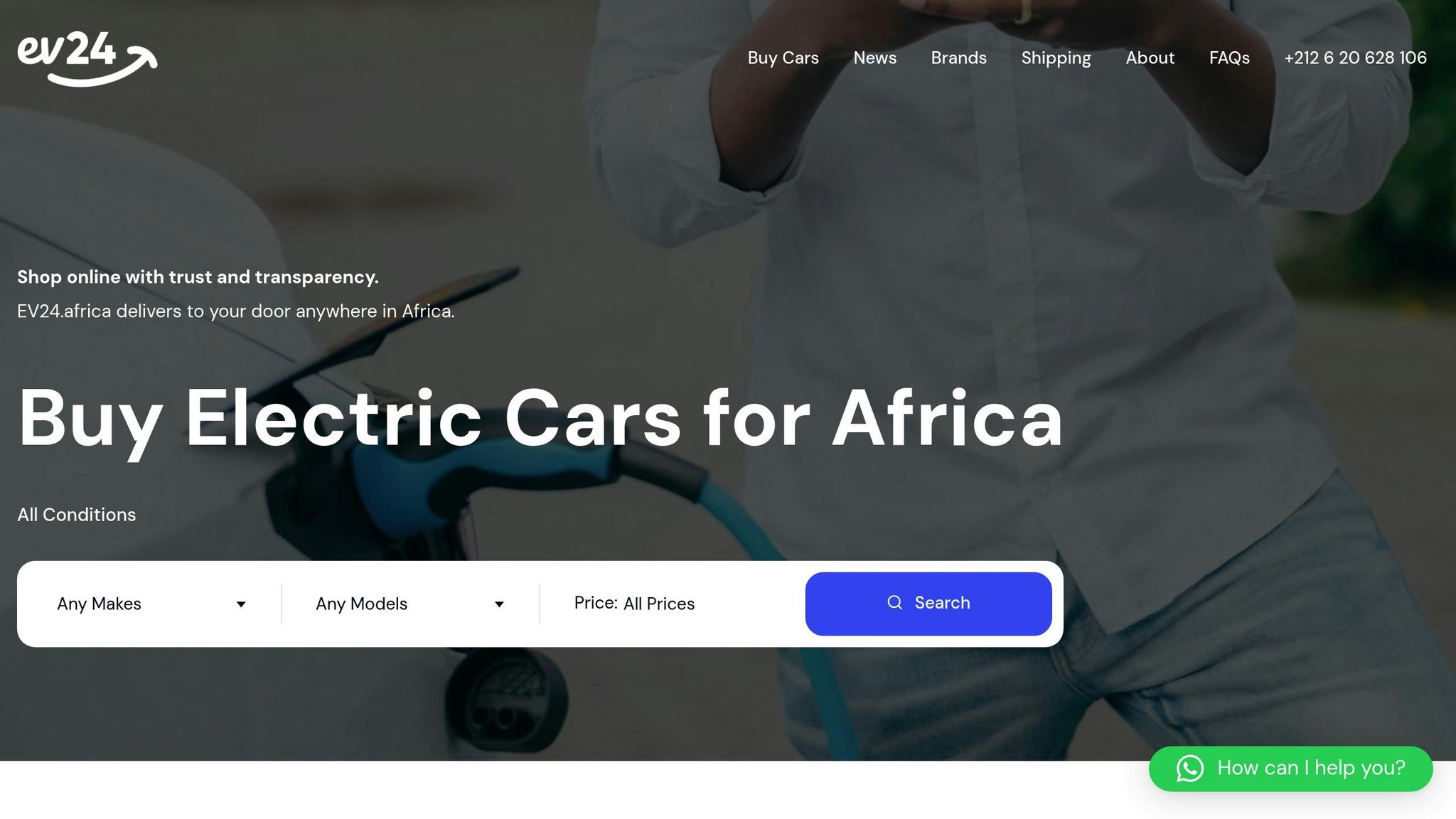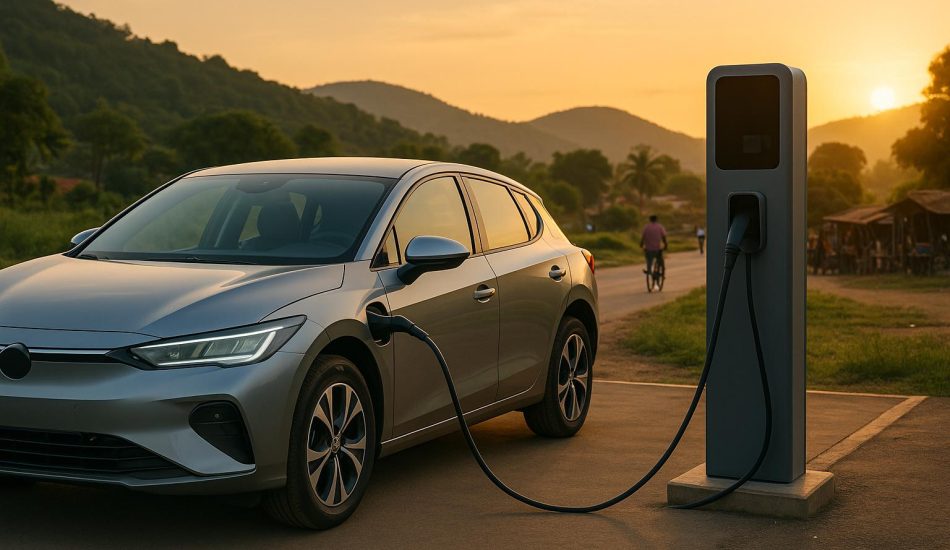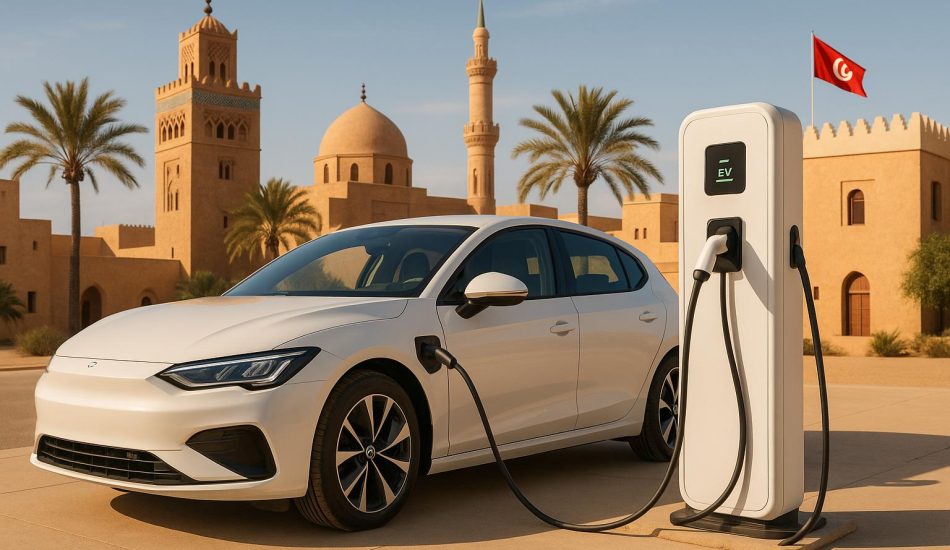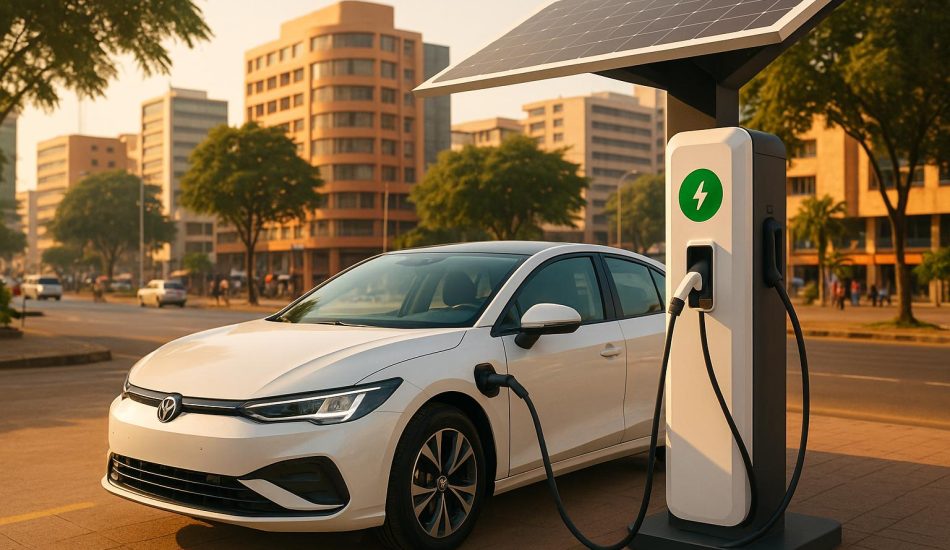
South Africa’s 2025 electric vehicle (EV) import regulations are reshaping the automotive industry with new rules, taxes, and incentives. Here’s what you need to know:
- Import Taxes: EVs face a 25% import duty, higher than the 18% for traditional cars. A new 15% tax on EV batteries adds to costs.
- Incentives for Local Production: Starting March 1, 2026, manufacturers can claim a 150% tax deduction on investments in EV or hydrogen vehicle production. This applies for ten years, encouraging local assembly and reducing reliance on imports.
- Challenges: Limited charging stations, high EV prices, and ongoing power issues slow adoption. EVs currently make up less than 1% of the market.
- Opportunities: South Africa aims to produce its first local EV by 2026, with plans to expand battery manufacturing and leverage trade agreements like AfCFTA to grow its EV market.
The new policies aim to balance local production growth with affordability for consumers, though challenges remain. Businesses and consumers who act early could benefit as the market evolves.
SA Auto Week 2024 | Call for subsidies to boost electric vehicle adoption
New EV Import Regulations for 2025
South Africa is rolling out new rules for electric vehicle (EV) imports in 2025, aiming to balance protection for local manufacturers with better access for consumers. This shift is part of the country’s broader strategy to establish itself as a leading EV hub in the region. The updated framework introduces changes in tax structures, incentives, and vehicle eligibility for benefits, marking a significant departure from previous policies.
Import Duties and Tax Updates
One of the biggest changes comes with the Production Rebate Certificate (PRC) system, replacing the older Production Rebate Credit Certificate (PRCC). Under the first phase of the Automotive Production and Development Programme (APDP), the PRCC only provided rebates on the customs value of imported vehicles. The new PRC system goes further by offering both production incentives and customs duty reductions based on local value addition.
The more local value a company adds, the greater the duty reductions they can claim. This approach is designed to encourage deeper investment in South Africa’s manufacturing sector rather than relying on finished vehicle imports.
Starting March 1, 2026, manufacturers will also be eligible for a 150% tax deduction on assets used to produce battery or hydrogen vehicles. This includes expenses for buildings, new machinery, plants, and other equipment directly tied to vehicle production.
"To encourage production of EVs in South Africa, the government will introduce an investment allowance for new investments, beginning 1 March 2026."
This incentive will run for a decade, ending on March 1, 2036, giving manufacturers a clear timeline for planning their investments. The Automotive Business Council (Naamsa) has praised this move, emphasizing its importance for attracting investment and driving innovation.
However, not all manufacturers will find the road smooth. Import duties remain steep for EVs, which face a 25% tax compared to 18% for traditional combustion engine vehicles. Advocacy groups like CHARGE are pushing for a six-year tax holiday on EV imports to address this disparity.
Adding to the challenges, a new 15% import duty on energy vehicle batteries has been introduced. Previously, these batteries were often imported duty-free or at reduced rates. While this aims to boost local battery production, it’s expected to increase consumer prices in the short term.
Covered Vehicles and Components
The regulations apply to a wide range of EVs and their components, reflecting South Africa’s commitment to clean energy solutions. The 150% tax deduction is available for assets used in producing both battery-powered and hydrogen-powered vehicles, ensuring support for multiple green energy technologies.
Battery electric vehicles (BEVs) remain the primary focus, given their growing market share. The rules also cover plug-in hybrid electric vehicles (PHEVs), which saw 602 units sold during the same period.
In addition to vehicles, the incentives extend to equipment used to manufacture critical EV components, aiming to strengthen the local supply chain and not just the final assembly process.
The African Continental Free Trade Area (AfCFTA) rules of origin will also play a major role. These rules determine whether products qualify for duty-free trade based on their manufacturing location. The finalization of these rules for the automotive sector is expected by October 2025, which will clarify which vehicles benefit from preferential trade agreements.
Short-term measures include temporary duty cuts on batteries used in locally produced and sold vehicles. This is designed to help local manufacturers remain cost-competitive while scaling up battery production.
Key Deadlines and Transition Periods
The new regulations follow a structured timeline, with important dates manufacturers and importers need to keep in mind. The 150% tax deduction takes effect on March 1, 2026, and companies planning to take advantage of this must have their operations ready by then.
The incentive window runs until March 1, 2036, providing a decade-long horizon for investments. To qualify, assets must be used within this timeframe, creating urgency for businesses considering EV manufacturing.
Another key date is October 2025, when the automotive rules of origin under AfCFTA are expected to be finalized. This will determine which vehicles qualify for preferential treatment under the trade agreement.
During the transition period, importers can continue operating under the current rules while adapting to the new framework. However, the steep 25% import duty on EVs – compared to the 18% for combustion vehicles – puts pressure on companies to localize production quickly.
Mark Raine, co-CEO of Mercedes-Benz South Africa, underscored the urgency of addressing these cost disparities:
"Electric vehicles in South Africa are too expensive and I always lobby for the fact that we need price parity of internal combustion engines and electric vehicles. I’m not even talking about subsidies. I’m just saying don’t put electric vehicles at a disadvantage. I could import a V12 super sports car at lesser import duties than an electric vehicle."
This phased approach encourages companies to invest locally. Early movers who establish operations before March 1, 2026, stand to gain significant advantages, while those relying on imports will continue to face higher costs. These deadlines and regulations set the stage for a challenging but transformative period for South Africa’s EV market.
Compliance Requirements for Importers and Manufacturers
South Africa is gearing up to strengthen its local electric vehicle (EV) production while aligning with the global automotive industry’s direction. To legally operate in this market, importers and manufacturers must navigate a detailed compliance framework, which includes proper documentation, certifications, and tax incentives. Multiple government agencies oversee these processes, each with specific requirements.
Required Documentation and Certification
Importing EVs into South Africa involves working with several regulatory bodies, starting with the South African Revenue Service (SARS). Importers must first register with SARS and obtain an importer’s code before initiating any import activities.
The customs process is centered around the Single Administrative Document (SAD), which serves as the primary declaration for imports. Alongside the SAD, importers need to provide a Bill of Lading, Commercial Invoice, Packing List, Insurance Certificate, and, where applicable, the Declaration of Origin Form DA59. These documents are essential for meeting both standard and preferential duty requirements, and they must adhere to SARS’s specified quantities.
To ensure vehicles meet safety and environmental standards, the National Regulator for Compulsory Specifications (NRCS) requires importers to obtain a Letter of Authority (LOA). This certification confirms compliance with South Africa’s safety and environmental regulations.
For used EV imports, an additional step involves obtaining an Import Permit from the International Trade Administration Commission (ITAC). This permit is non-transferable, valid only for the calendar year of issuance, and must be secured before shipment. Personal importers face further requirements, such as proof of ownership and residency through vehicle registration certificates, passports, and permanent residency documents. Once the vehicles arrive, they must pass roadworthiness tests and be registered with the relevant authorities.
Tax Benefits for Local EV Manufacturing
South Africa offers compelling tax incentives to encourage local EV production. One standout benefit is the 150% tax deduction for manufacturers investing in new production capacity. This incentive applies to qualifying investments in new buildings, machinery, and equipment specifically for EV production. To qualify, these assets must be new, unused, and brought into use between March 1, 2026, and March 1, 2036. The government estimates this incentive will cost around R500 million in tax expenditure for the 2026/27 fiscal year.
Manufacturers also have access to research and development (R&D) tax deductions. Companies can claim a 150% deduction on eligible R&D expenses, provided they secure pre-approval from the Department of Science and Innovation. Additionally, the Production Rebate Certificate (PRC) system offers duty credit certificates, which allow final manufacturers to offset customs duties on qualifying products.
However, advocacy groups like CHARGE argue for further reforms. They highlight that current import duties for EVs (25%) are significantly higher than those for combustion engine vehicles (18%), which inflates EV prices and slows market growth:
"This incentive to boost local manufacturing is a positive step forward, but we also need to reduce the current high import duties for EVs – 25% compared to 18% for combustion engine vehicles. These taxes inflate EV prices, slow demand, and limit market growth."
How to Meet Compliance Requirements
Navigating South Africa’s EV import regulations requires meticulous planning. The process begins with registering with SARS and obtaining an importer’s code, which is essential for all import-related activities. Importers must also secure any necessary licenses for restricted items well before shipment, as these permits cannot be issued retroactively.
For used vehicles, obtaining the ITAC Import Permit is critical. Since these permits are only valid for the calendar year of issuance, importers must carefully time their applications and shipments. Additionally, early engagement with the NRCS is key to securing the required Letter of Authority, which involves submitting technical documentation and test results to demonstrate compliance with national safety and environmental standards.
Manufacturers aiming to claim the 150% tax deduction must ensure that their investments meet the specified guidelines, including the timeline for bringing assets into use (March 1, 2026, to March 1, 2036). Similarly, companies pursuing R&D deductions must apply for pre-approval from the Department of Science and Innovation before starting their projects.
The Automotive Production Development Programme (APDP) also provides opportunities to increase production and create jobs in the sector. Participating in industry consultations can help manufacturers stay informed about these incentives as they roll out.
Once the vehicles arrive, the final steps include roadworthiness testing and registration with the appropriate authorities. These steps confirm that the imported EVs meet local standards and are ready for sale.
South Africa’s regulatory framework, as outlined in the Electric Vehicles White Paper, emphasizes building regional value chains and adapting to global industry trends. Companies that thoroughly understand and efficiently navigate these requirements will be better positioned to thrive in South Africa’s growing EV market.
Cost Impact for Consumers and Businesses
The 2025 EV import regulations are set to reshape expenses for both car buyers and importers. Understanding these cost dynamics is essential for navigating South Africa’s evolving automotive market, especially as the country seeks to balance local production incentives with market expansion.
Import Cost Breakdown
Importing electric vehicles (EVs) in South Africa comes with a complex web of duties. EVs face a 25% import duty compared to 18% for combustion engine vehicles, creating a pricing disadvantage for EVs. However, strategic sourcing can help lower these costs. For instance, the European Union Free Trade Agreement reduces import duties by 7% for EVs sourced from EU countries, effectively matching the 18% duty applied to traditional vehicles. Dr. Norman Lamprecht of the Automotive Industry Export Council explains:
"It’s not about any differentiation between internal combustion vehicles and electric vehicles, but about our free trade agreements."
Beyond import duties, additional costs include VAT, ad valorem taxes (up to 30% for vehicles priced over $50,000), and carbon dioxide taxes.
A new 10% duty on EV or NEV batteries imported under Chapter 98 adds another layer of cost. This applies to both fully assembled vehicle imports and aftermarket battery replacements. For businesses considering local assembly, a proposed 15% import tax on new energy vehicle batteries is designed to encourage domestic battery production. These cumulative costs significantly impact retail prices, making EVs less affordable for consumers.
How EV Prices Will Change for Consumers
For South African consumers, high EV prices remain a major hurdle. Take the BYD Dolphin, one of the more affordable EVs – it costs around R700,000, which is R200,000 to R300,000 more than comparable petrol-powered cars.
The steep import duties are a key factor driving up EV prices, which helps explain why battery electric vehicles (BEVs) still hold a market share of less than 1%. While this figure has inched upward from 0.4% in 2022 to 1.2% in 2025, the pace is slow. According to CHARGE, an advocacy group:
"This incentive to boost local manufacturing is a positive step forward, but we also need to reduce the current high import duties for EVs – 25% compared to 18% for combustion engine vehicles. These taxes inflate EV prices, slow demand, and limit market growth."
Despite these obstacles, EV sales have seen an 80% growth between 2023 and 2025. Looking ahead, the government’s introduction of a 150% tax deduction for local EV manufacturing, starting March 1, 2026, could help reduce costs for consumers over time.
Before and After 2025: Cost Comparison
| Cost Component | EVs (Standard) | EVs (EU Import) | Traditional Vehicles | EV Batteries |
|---|---|---|---|---|
| Import Duty | 25% | 18% (after 7% reduction) | 18% | 10% (Chapter 98) |
| VAT | Standard rate | Standard rate | Standard rate | Standard rate |
| Ad Valorem Tax | Up to 30% (>$50,000) | Up to 30% (>$50,000) | Up to 30% (>$50,000) | Not applicable |
This table highlights the current cost challenges and the potential savings tied to local manufacturing incentives.
One of the most impactful changes is the new manufacturing incentive framework. Companies investing in local EV production between March 1, 2026, and March 1, 2036, can claim a 150% tax deduction on qualifying investments. The Automotive Business Council (Naamsa) has emphasized the importance of this development:
"[The tax incentive] is a crucial step in attracting investments, fostering innovation and enhancing the sector’s growth within South Africa. The sector has been working towards an EV stimulation policy for some time."
Currently, 99% of vehicles produced locally still rely on traditional fuel, which leaves significant room for growth in domestic EV manufacturing.
For businesses, the evolving regulatory framework presents an opportunity for strategic positioning. Companies that establish local assembly operations before the March 2026 deadline can take advantage of manufacturing incentives and potentially reduce component import costs, giving them a competitive edge as the market matures.
This mix of immediate cost pressures and long-term opportunities paints a dynamic picture of South Africa’s shifting EV landscape.
sbb-itb-99e19e3
Growth Opportunities in the African EV Market
South Africa’s upcoming 2025 EV import regulations are opening up exciting new doors for investments in Africa’s electric vehicle (EV) market. Government incentives are playing a key role in driving momentum and attracting funding into this space.
Business Opportunities for Importers and Dealerships
New policies, such as a 150% tax deduction for qualifying EV manufacturing investments, could draw as much as $1.6 billion in private capital.
Additionally, U.S. tariffs on Chinese EVs are pushing manufacturers to explore alternative markets, with South Africa emerging as a strong contender.
On top of that, the South African government has committed $54.27 million to support the local production of EVs and batteries. This move not only strengthens dealership access to competitively priced EVs but also positions South Africa as a potential leader in regional EV production.
South Africa as a Regional EV Manufacturing Hub
As the largest automotive hub in sub-Saharan Africa, South Africa is well-placed to become a regional center for EV production. Its well-established automotive sector already has the infrastructure and expertise needed to support this shift.
The Electric Vehicles White Paper, introduced in 2023, outlines a clear plan to transition the automotive industry toward EVs by 2035. This long-term vision provides a stable foundation for manufacturers and investors alike. Finance Minister Enoch Godongwana underscored this commitment:
"To encourage production of EVs in South Africa, the government will introduce an investment allowance for new investments, beginning 1 March 2026."
The African Continental Free Trade Area (AfCFTA) is also prioritizing automotive development, which could enhance regional supply chains and allow South African manufacturers to reach a broader market. Furthermore, the planned regional strategy for critical minerals – essential for EV batteries and solar panels – further solidifies South Africa’s role as a key player.
Currently, as of February 2025, 99% of cars produced locally still rely on traditional fuel. This highlights the enormous potential for growth in the EV sector. The Automotive Business Council (Naamsa) has acknowledged this opportunity:
"The incentive is a crucial step in attracting investments, fostering innovation and enhancing the sector’s growth within South Africa. The sector has been working towards an EV stimulation policy for some time."
EV24.africa‘s Role in Supporting the EV Ecosystem

As the EV market evolves, digital platforms are stepping in to bridge gaps between investors, dealerships, and consumers. EV24.africa is one such platform, tackling barriers to market entry and facilitating growth. It offers a wide selection of new and used EVs from leading brands like Tesla, BYD, Leapmotor, ROX, Dongfeng, Geely, Hyundai, Toyota, and Suzuki, with delivery available to all 54 African countries.
One of the platform’s standout features is its financing options, which help address the high upfront costs that often deter EV adoption. EV24.africa’s business manager, Younes Rabeh, highlighted the platform’s rapid traction:
"In just three months, we’ve proven that the demand for electric mobility in Africa is not only real but accelerating. Our team is building more than a marketplace – we are laying the infrastructure and services to support Africa’s electric transition at scale." [18]
In addition to financing, EV24.africa provides transparent pricing, detailed data, and analytics to reduce uncertainty for buyers while boosting visibility for dealerships. CEO and Co-Founder Axel Peyriere emphasized the platform’s broader mission:
"EV24.africa is a strategic move aligned with our mission to reshape mobility in Africa. Backed by Stellantis and built with a lean, digital-first approach, we are uniquely positioned to scale EV adoption across the continent and make sustainable transport a reality for all." [18]
With South Africa’s EV market expected to grow by 8.69% annually through 2029, reaching a market volume of $141.6 million[18], platforms like EV24.africa are playing a crucial role in connecting supply with the increasing demand across the continent.
Conclusion: Understanding South Africa’s EV Import Rules in 2025
South Africa’s 2025 electric vehicle (EV) import regulations mark a major turning point for the automotive industry and the broader EV market across Africa.
The updated framework introduces a dual strategy aimed at balancing market protection with incentives for growth. On one hand, the 15% import duty on new energy vehicle (NEV) batteries may initially increase costs for consumers. On the other hand, the introduction of a 150% tax deduction for EV manufacturers starting March 1, 2026, is designed to attract global investors and potentially drive down long-term prices.
For businesses, the time to act is now. Companies need to finalize tariff details for NEV batteries under the new import duty, explore alternative sourcing options, or consider investing in local assembly operations. Staying informed on updates to the Automotive Production and Development Programme (APDP) Regulations and Guidelines is also essential to take full advantage of available incentives.
Consumers, too, stand to benefit in the long run. The growing network of charging infrastructure – now boasting over 400 stations nationwide – continues to lower practical barriers to EV adoption while offering the potential for long-term savings.
These regulations also address pressing environmental concerns. With the transportation sector contributing 11% of South Africa’s greenhouse gas emissions, the shift to electric vehicles represents both an economic opportunity and a critical step toward reducing carbon output.
Digital platforms are playing an increasingly important role in this transition. As South Africa aims to establish itself as a regional hub for EV manufacturing, platforms like EV24.africa are helping connect supply and demand across the continent. The combination of supportive policies, expanding infrastructure, and innovative digital tools creates a unique opportunity to advance sustainable transportation across all 54 African countries.
The key to success lies in how quickly businesses and consumers adapt to this changing landscape. Those who act now will be best positioned to take advantage of the opportunities this shift presents.
FAQs
How will South Africa’s 2025 EV import regulations affect electric vehicle prices for consumers?
South Africa’s Updated EV Import Regulations
Starting in 2025, South Africa’s new import regulations for electric vehicles (EVs) are set to bring higher costs for consumers. A 25% import tax, combined with extra tariffs on batteries and components, could push EV prices up by as much as 34% compared to current levels.
This price hike might make EVs less accessible to many South Africans, potentially slowing down their adoption. On the flip side, these regulations could pave the way for increased local manufacturing and assembly. Over time, this shift might not only help bring prices down but also open up new opportunities within the country’s EV market.
What incentives are available for EV production in South Africa, and how can manufacturers qualify?
South Africa is rolling out attractive incentives to boost local production of electric vehicles (EVs) and batteries. Beginning in March 2026, manufacturers can take advantage of a 150% tax deduction on qualifying investments. To qualify, businesses must channel funds into local manufacturing facilities, infrastructure, or related operations, all while aligning with government-approved programs.
The goal behind these incentives is clear: to fuel the EV industry’s growth while creating jobs and driving economic progress. For manufacturers, this presents an opportunity to cut costs and strengthen their foothold in the African EV market.
How will the African Continental Free Trade Area (AfCFTA) impact South Africa’s EV import rules and market growth in 2025?
The Impact of AfCFTA on South Africa’s EV Market
The African Continental Free Trade Area (AfCFTA) is poised to play a major role in shaping South Africa’s electric vehicle (EV) market. By establishing a massive trade zone that spans across Africa and connects over 1.3 billion people, AfCFTA aims to simplify trade and reduce tariffs. This creates a fertile ground for regional manufacturing and cross-border trade, including the automotive sector and EVs. For South Africa, this could mean lower import costs, better access to African markets, and a stronger position in the growing EV industry.
AfCFTA also tackles non-tariff barriers, encourages investment, and promotes trade in services. These efforts pave the way for South Africa to boost its EV exports across the continent. Importantly, this aligns with the country’s climate-focused goals and domestic policies, helping build a more sustainable and interconnected EV market throughout Africa.




